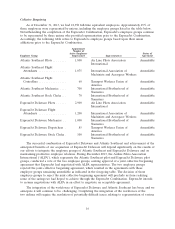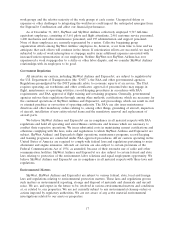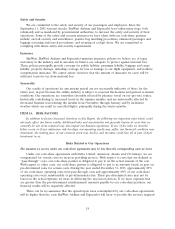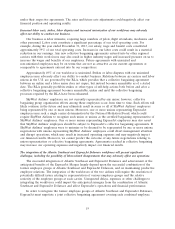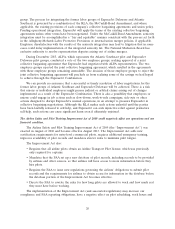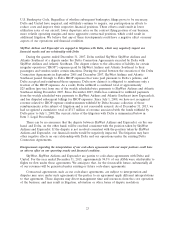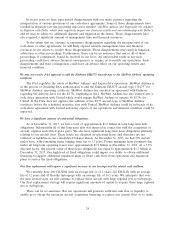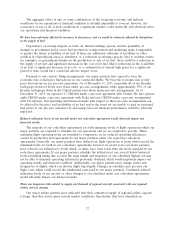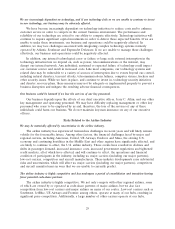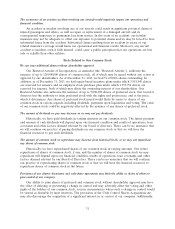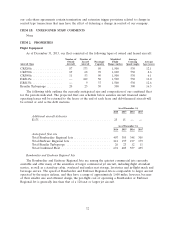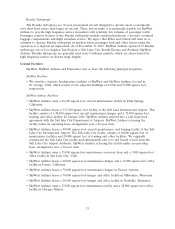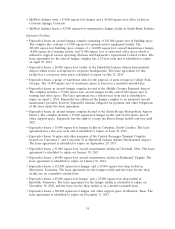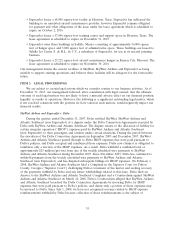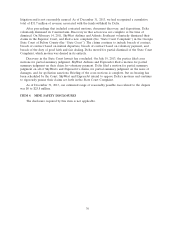SkyWest Airlines 2013 Annual Report Download - page 31
Download and view the complete annual report
Please find page 31 of the 2013 SkyWest Airlines annual report below. You can navigate through the pages in the report by either clicking on the pages listed below, or by using the keyword search tool below to find specific information within the annual report.could constitute a breach of the applicable code-share agreement, which could have a material adverse
effect on our operations.
We could be adversely affected by an outbreak of a disease that affects travel behavior.
In 2010, there was an outbreak of the H1N1 flu virus which had an adverse impact throughout our
network. In 2003, there was an outbreak of Severe Acute Respiratory Syndrome (‘‘SARS’’), which had
an adverse impact on travel behavior. In addition, in the past there have been concerns about
outbreaks or potential outbreaks of other diseases, such as avian flu. Any outbreak of a disease
(including a worsening of the outbreak of the H1N1 flu virus) that affects travel behavior could have a
material adverse impact on our operating results and financial condition. In addition, outbreaks of
disease could result in quarantines of our personnel or an inability to access facilities or our aircraft,
which could adversely affect our operations and financial condition.
Interruptions or disruptions in service at one of our hub airports, due to adverse weather or for any other
reason, could have a material adverse impact on our operations.
We currently operate primarily through hubs in Atlanta, Los Angeles, Houston, Minneapolis,
Detroit, San Francisco, Salt Lake City, Chicago, Denver, Houston, Washington, D.C., Newark,
Cleveland and the Pacific Northwest. Nearly all of our flights either originate from or fly into one of
these hubs. Our revenues depend primarily on our completion of flights and secondarily on service
factors such as timeliness of departure and arrival. Any interruptions or disruptions could, therefore,
severely and adversely affect us. Extreme weather can cause flight disruptions, and, during periods of
storms or adverse weather, fog, low temperatures, etc., our flights may be canceled or significantly
delayed. Hurricanes Katrina and Rita and Superstorm Sandy, in particular, caused severe disruption to
air travel in the affected areas and adversely affected airlines operating in the region, including
ExpressJet. We operate a significant number of flights to and from airports with particular weather
difficulties, including Atlanta, Salt Lake City, Chicago, San Francisco, Newark and Denver. A
significant interruption or disruption in service at one of our hubs, due to adverse weather or
otherwise, could result in the cancellation or delay of a significant portion of our flights and, as a
result, could have a severe adverse impact on our, operations and financial performance.
Economic and industry conditions constantly change, and negative economic conditions in the United States
and other countries may create challenges for us that could materially and adversely affect our operations and
financial condition.
Our operations and financial condition are affected by many changing economic and other
conditions beyond our control, including, among others:
• disruptions in the credit markets, which have resulted in greater volatility, less liquidity, widening
of credit spreads, and decreased availability of financing;
• actual or potential changes in international, national, regional and local economic, business and
financial conditions, including recession, inflation, higher interest rates, wars, terrorist attacks or
political instability;
• changes in consumer preferences, perceptions, spending patterns or demographic trends;
• changes in the competitive environment due to industry consolidation and other factors;
• actual or potential disruptions to U.S. air traffic control systems;
• outbreaks of diseases that affect travel behavior; and
• weather and natural disasters.
26


